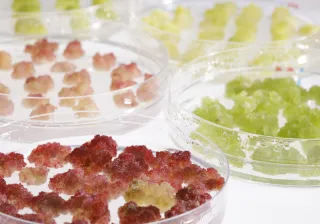Enifer, a biotech startup from Finland, transforms industrial by-products into environmentally friendly protein. Their fungal mycoprotein PEKILO® uses minimal water and arable land, and is an ideal drop-in ingredient for aquafeed, pet food and food production. Enifer harnesses fungal fermentation – an age-old technique – to feed the world with their sustainable alternative to conventional plant-based and animal protein sources.
With our fungal protein, we want to provide a novel option to traditional plant- and animal-based proteins.
“Currently, up to a third of the world’s emissions come from the food industry,” says Simo Ellilä, CEO and Co-founder of Enifer. “Yet efforts and investments to address the issue are minuscule. If we want to curb greenhouse gas emissions, the food industry needs a great deal of innovation.”
Enter Enifer, a biotech spin-off from VTT Technical Research Centre of Finland, dedicated to promoting sustainable food production through biotechnology. Leveraging fungal fermentation, the company produces PEKILO® mycoprotein – a sustainable alternative to plant- and animal-based protein sources.
“With our fungal protein, we want to provide a novel option to traditional plant- and animal-based proteins,” Ellilä explains.
Fungal protein offers the best of both animal and plant proteins
Today, most people get their protein from plants or animals. While plant-based proteins generally have a lower impact on land, water and greenhouse gas emissions, animal proteins are known for being more nutritious.
“PEKILO® mycoprotein combines the best of both worlds,” Ellilä explains. “Since fungal protein is produced from industrial by-products and side streams, it is even more sustainable than plant protein as it does not require new arable land. Additionally, its nutritional profile is superior to that of plant proteins. It’s also a good source of fibre.”
The mass markets have been slow to adopt plant-based meat alternatives, partly due to their unappealing taste.
With a chuckle, Ellilä remarks: “The beauty of PEKILO® mycoprotein lies in the fact that it doesn't really have a taste. Thanks to its neutral flavour, PEKILO® is perfect for a wide range of applications.”
PEKILO®’s history dates back to the 70s
The PEKILO® process was originally developed by Finnish forest industry engineers in the 1970s. Back then, the mycoprotein was produced using a by-product of paper making and served as animal feed for pigs and chickens.
In the early 1990s, however, production halted as the by-product stream from paper and pulp mills declined. Subsequently, the forest industry businesses transferred the fungal strain to VTT Culture Collection – Finland's sole official microbial collection.
There, the strain lay dormant in VTT’s deep freezer for three decades.
Awakening the dormant fungus
In 2010, Ellilä became a part of VTT's industrial biotechnology department, focusing on researching methods to produce biofuels from various side streams. Six years later, he stumbled upon the long-forgotten PEKILO® process, recognising its ideal fit for repurposing side streams and address the research challenges he had been facing.
“When we looked at the PEKILO® process, we realised its potential not only for biofuel producers but also for transforming other side streams into valuable products,” Ellilä explains. “With my VTT colleague Ville Pihlajaniemi, the current Chief Technology Officer of Enifer, we decided to bring the process back to life.”
Since then, Enifer has taken the original process many steps further and created a food-grade ingredient using the PEKILO® technology.
“When we launched our company, we had two main goals: first, to show that the process could work with many different side streams, and second, to adapt the product to suit various markets. While we already knew the fungal mycoprotein could be served as animal feed for chickens and pigs, we wanted to offer it for farmed fish, pets and people, too,” says Ellilä.
VTT’s deep-tech incubator vital in going from innovation to business
Unlike many start-ups that get started with just an innovative idea and dreams of making it big, Enifer had a clear advantage with the tried and tested technology of PEKILO®.
Right from the start, they were able to accurately calculate the production costs and devise strategies for profitability. And their confidence in the technology’s impact was unwavering.
“Our big breakthrough came when we joined VTT LaunchPad, VTT’s start-up accelerator program. Finally, we had resources at our disposal and were able to dedicate time for experiments and demonstrations,” Ellilä recaps. “Most importantly, LaunchPad provided us with the opportunity to network and talk to potential investors and partners. In fact, in the very first meet and greet event, we found an investor who liked our pitch, decided to invest and has stuck with us ever since.”
Gearing up the production of Pekilo: Commercial-scale factory in the works
Four years later, Enifer has grown into a team of 25, and started the construction of a new, commercial-scale factory capable of producing approximately 3 million kilograms of mycoprotein annually.
“Our PEKILO® mycoprotein has been very well received. It's been exciting to see a lot of interest coming our way, with many reaching out to explore potential collaborations,” Ellilä reveals.
“We believe fungal protein will be the next big thing. We have already shown that the process is effective and scales rapidly. This is promising news as the world urgently needs solutions to address global emissions. At Enifer, we are fully equipped to drive this transformation.”
Source of photos: Enifer's photo collection







